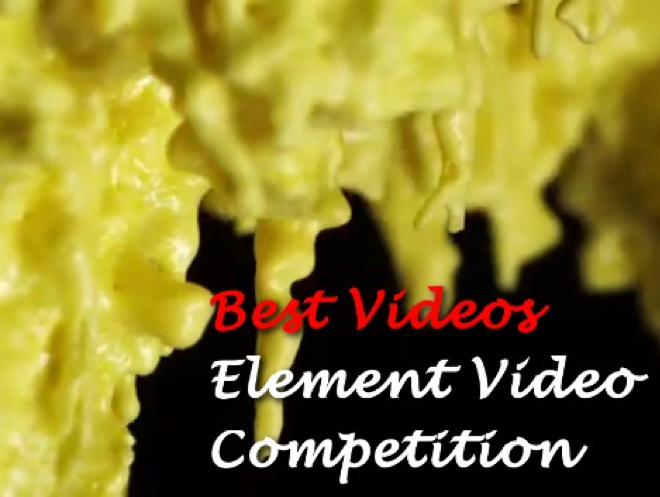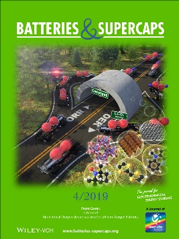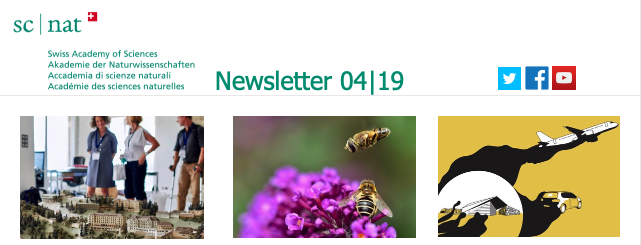Chemistry in Europe Newsletter, 2/2019
Hello and welcome to the second edition of the 2019 Chemistry in Europe - the newsletter for chemists and beyond, with contributions from our team, Members, Professional Networks and more.
Access the full online newsletter by clicking here.
What to expect in this issue:
Focus
EuChemS and ACS meet in Orlando
Policy
Plan S and Open Science
Research
14thEYCN Delegate Assembly in Bremen
Chemistry Rediscoveredvideo contest "In Your Element"Food Chemistry for the future of Europe
Members' Perspectives
Global Women's BreakfastMinisters of Education of the European Higher Education Area approve new edition of the Diploma Supplement
Meet...
Notes
EUCYS Prize - interview
Obituary: remembering Sergio Facchetti
Happy Reading,
CiE Editorial Board
David Spichiger, SCS
07.05.2019
SCNAT Newsletter, April 2019/4
Miteinander die Gesellschaft verändern
Das Miteinander und nicht individuelle Bewertungen wissenschaftlicher Qualität führen zu Exzellenz und Veränderungen in der Gesellschaft, schreibt Marcel Tanner, Präsident der SCNAT, im neu erschienenen Jahresbericht. Weiter
Auch in der Schweiz gehen die Insekten zurück
Der Rückgang und die Gefährdung der Insekten sind wissenschaftlich gut dokumentiert und die wichtigsten Ursachen dafür sind bekannt. In einem neuen Faktenblatt fordert das Forum Biodiversität Schweiz der SCNAT rasches Handeln. Weiter
Für eine CO₂-freie Wissenschaft
Forschende fliegen rege um die Welt, um sich an Konferenzen auszutauschen. Wie lässt sich die Wissenschaft klimaverträglich gestalten? Das diskutieren Expertinnen und Experten an einer Veranstaltung der SCNAT in Bern. Weiter
Biodiversität im Alltag
Biodiversität ist allgegenwärtig: Sie steckt nicht nur in Wald und Garten, sondern auch in den Töpfchen und Tuben im Badezimmerschrank, in Lebensmitteln, in Kleidern und Möbeln. Die aktuelle Ausgabe des Magazins «Hotspot» des Forums Biodiversität Schweiz zeigt, wo wir der Biodiversität im Alltag offensichtlich oder im Verborgenen begegnen und wie die Wahrnehmung von Biodiversität mit unseren Wertvorstellungen zusammenhängt. Weiter
Working in effective partnerships to address sustainable development goals
A joint workshop in Tanzania held by UK Research and Innovation and SCNAT Commission for Research Partnerships with Developing Countries (KFPE) brought together researchers and stakeholders from the Global South to identify best practices in research partnerships. The workshop report is now available. It highlights the needs to embed equitable partnership principles throughout the funding cycle, to empower researchers to engage in equitable partnerships and to design research programmes with impact in mind. In addition, the report gives advice to funders about how they can engage more on various levels to make North-South research programmes more equitable and more effective. More
How to design transdisciplinary projects?
A recently updated online portal hosted by the Network for Transdisciplinary Research (td-net) offers a point of entry to methods and tools that support collaboration between experts and stakeholders from science and practice to tackle societal challenges. It specifically focuses on jointly developing projects, conducting research and exploring ways to impact in heterogeneous groups. It is intended to help shape collaboration between experts and stakeholders from science and practice in systematic and traceable ways. More
Effektivere Kommunikation zum Klimawandel
Wie lässt sich der Klimawandel stärker in den Fokus der Öffentlichkeit rücken? Wie sehen neue Wege der Klimakommunikation aus? Soziologie, Politikwissenschaften, Linguistik, Kommunikations- oder Medienwissenschaften haben viel dazu zu sagen, wie Menschen über den Klimawandel denken und wie Entscheidungen zum Klimaschutz getroffen werden – oder eben nicht. Der «K3 Kongress zu Klimawandel, Kommunikation und Gesellschaft» am 24. bis 25. September 2019 in Karlsruhe präsentiert neueste Erkenntnisse aus der Forschung so, dass Praktikerinnen und Praktiker sie nutzen können. Der Kongress wird vom Forum für Klima und globalen Wandel (ProClim) der SCNAT mitorganisiert. Weiter
Climate change: new narratives and visual language are needed
Facing climate change, we need to have new narratives for the future and should not just reshuffle visions from the 1980's. Climate communication has to define a new visual language: away from polar bears towards authentic people in everyday situations. The 20th Swiss Global Change Day organized by the Forum for Climate and Global Change (ProClim) in Bern offered the opportunity to look beyond the horizon of climate and global change research covering a broad range of topics. Distinguished researchers presented scientific highlights. About 190 participants attended the event. More
Ameisen erforschen zum Geburtstag
Die Sociéte vaudoise des sciences naturelles und die Naturwissenschaftliche Gesellschaft St. Gallen feiern im 2019 ihr zweihundertjähriges Bestehen. Die Naturwissenschaftliche Gesellschaft Thun begeht dieses Jahr ihren hundertsten Geburtstag. Alle drei Organisationen warten mit abwechslungsreichen Jubiläumsprogrammen auf. Die Sociéte vaudoise zum Beispiel will im Rahmen der Opération Fourmis mit Hilfe der Bevölkerung die Vielfalt der Ameisen im Kanton besser erforschen. Weiter
Eine Schweizerin wird Sondergesandte des International Science Council
Das International Science Council (ISC) hat Flavia Schlegel zu seiner Sonderbeauftragten für Wissenschaft in der globalen Politik ernannt. Ihre Aufgabe ist es, die Sichtbarkeit und Stimme der internationalen Wissenschaftsgemeinschaft innerhalb der Vereinten Nationen und anderer globaler Politikforen, zum Beispiel der G20, zu stärken. Die SCNAT ist Mitglied des ISC. Weiter
Akademie der Naturwissenschaften Schweiz (SCNAT)
Haus der Akademien | Laupenstrasse 7 | 3008 Bern
Andres Jordi | Tel. 031 306 93 23 | www.scnat.ch
Fragen und Anregungen:
ChemPubSoc Europe News, April 2019
ChemistryViews.org: The Best Element Videos
 April marks the half time of the Element Video Competitionand the first winning videoshave been announced.
April marks the half time of the Element Video Competitionand the first winning videoshave been announced.
We invite you to share a short video too: It should show an element or an element in its compounds in a visually appealing way. The competition runs until October 1st.
Element Video Competition
Winning Videos
Batteries & Supercaps: Special Issue: Bifunctional Catalysts for Metal‐Air Batteries
 Have you checked out Batteries & Supercaps’ very first topical Special Issue?
Have you checked out Batteries & Supercaps’ very first topical Special Issue?
The theme isBifunctional Catalysts for Metal-Air Batteriesand featuresreviews and original research by leaders in the field, e.g. a minireviewby Kisuk Kang et al. or this articleby Marcel Risch et al.
David Spichiger, SCS
29.04.2019
Ruzicka-Prize 2019: call for nominations

The Ruzicka-Prize is awarded each year to a young scientist for her/his outstanding, published contribution in the field of chemistry, achieved either in Switzerland or by a Swiss citizen abroad.
Proposals for candidates (age limit 40 years) may be submitted written or e-mail until September 17th, 2019 (date of receipt) to the
ETH Zürich
Departement Chemie und Angewandte Biowissenschaften D-CHAB
Prof. Dr. Gunnar Jeschke
Vladimir-Prelog-Weg 2
HCI H 207/209
CH-8093 Zürich
More details on:
https://www.chab.ethz.ch/outreach/oeffentlichkeitsarbeit/ruzicka-preis.html
David Spichiger, SCS
16.04.2019
EuChemS Position Paper on the Guidance on the Implementation of Plan S
![]() On 4 September 2018, 'cOAlition S', a coalition of national research funders, supported by the European Commission, launched 'Plan S', an initiative to accelerate the transition to open access in scientific publishing. Currently, several national funding bodies in Europe have committed to Plan S, others have not. The plan consists of 10 principles for the transition to Open Access and more specific implementation guidelines were published by cOAlitionS on 27 November 2018.
On 4 September 2018, 'cOAlition S', a coalition of national research funders, supported by the European Commission, launched 'Plan S', an initiative to accelerate the transition to open access in scientific publishing. Currently, several national funding bodies in Europe have committed to Plan S, others have not. The plan consists of 10 principles for the transition to Open Access and more specific implementation guidelines were published by cOAlitionS on 27 November 2018.
EuChemS supports the transition to Open Access (OA) in scientific publishing. Access to research and dissemination of knowledge is a fundamental purpose of our community’s values and aims. As a representative for research chemists and chemical societies across Europe, we welcome the conversation and the debate that this has engendered and look forward to working together with all stakeholders on finding sustainable solutions that secure the interests of researchers, societies, funders, librarians and publishers involved in the important task of disseminating scientific research.
Although the implementation guidelines provide some clarifications, we believe the consequences of Plan S remain unclear and could undermine the visibility and vitality of European research on a global stage if not properly implemented.
Read the full statement by EuChemS
David Spichiger, SCS
16.04.2019
Page 64 of 298


